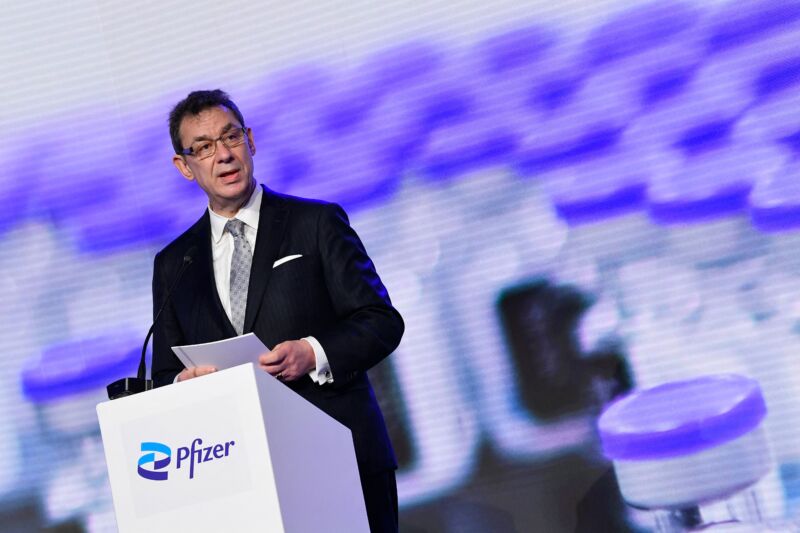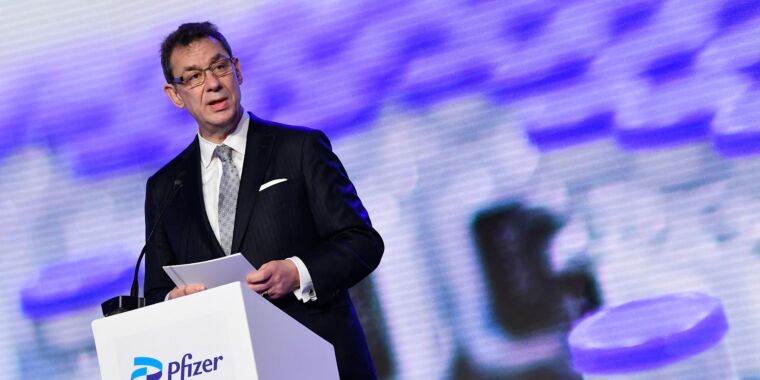free price hikes —
Insurance companies will pay more, potentially leading to higher premiums.

Enlarge / Pfizer CEO Albert Bourla talks during a press conference with the European Commission president after a visit to oversee the production of the Pfizer-BioNtech COVID-19 vaccine at the factory of US pharmaceutical company Pfizer, in Puurs, on April 23, 2021.
Pfizer CEO Albert Bourla claimed at a news event last week that the company’s COVID-19 vaccines will continue to be “free to all Americans,” despite the company’s plan to raise the price of the vaccine roughly 400 percent—a price difference that will be picked up by health insurers.
The company said in October that it plans to raise the price of a dose of its COVID-19 vaccine from about $30 to somewhere between $110 and $130 as it moves the shots to the commercial market next year.
Until now, all COVID-19 vaccines in the US have been bought by the US government, which paid $30.48 per dose in its latest vaccine supply agreement from June. The US government had previously paid $24 per dose in July 2021 and $19.50 per dose in July 2020. The government offered all the doses to Americans for free.
Now, the company expects health insurance companies to pick up the tab, however larger. “Based on our current understanding, when we enter a traditional commercial model, anyone with commercial or government insurance who is eligible to be vaccinated should be able to access the vaccine without any out-of-pocket payments,” Angela Lukin, Pfizer’s US president of global primary care, said in an October call with investors.
That assumption led Bourla to suggest last week that the large price hike would be “free.”
“Americans will see no difference,” he said, according to Stat News, which hosted the event. The vaccine will “be free for them to get, regardless of the insurance they have.”
“Double talk”
But outsiders were quick to point out flaws in that statement. For one, it would seem that the shots would no longer be free for those without insurance. Moreover, for those with insurance, the lack of out-of-pocket costs at the time of vaccination does not mean that the price hike is free. The hiked price will be absorbed by health insurance companies, which may pass on the extra cost in the form of higher premiums.
The cost “ultimately comes out of workers’ paychecks,” Stat’s health care business reporter, Bob Herman, pointed out.
David Mitchell, co-founder of the advocacy group Patients for Affordable Drugs, echoed the point. “[Bourla said] repeatedly that COVID vaccines priced at $120 a dose will be ‘free.’ It’s not true,” Mitchell tweeted. “It’s more Bourla/pharma double talk.”
It’s unclear what price Moderna will set for its COVID-19 vaccine when it moves to the commercial market next year. But, financial analysts who spoke with Reuters said Pfizer’s price could drive up the prices of rivals.
Pfizer’s price is not wildly out of the normal range for vaccinations. While the annual flu shot can range from $50 to $95 at CVS for those without insurance, an MMR vaccine goes for $135, a shingles vaccine goes for $179, and meningitis vaccines are a little over $200.
Still, Pfizer’s price between $110 and $130 is higher than financial analysts expected for the COVID-19 vaccines. “This is much higher than our assumption of $50 per shot,” Wells Fargo analyst Mohit Bansal wrote in a research note, according to Reuters. Bansal added that the pricing could add around $2.5 billion to $3 billion to Pfizer’s annual revenue.
It’s unclear how the commercial price hike—likely to occur in the first quarter of next year—will influence booster uptake. Currently, uptake is dismal. Only 11 percent of Americans eligible for an updated COVID-19 booster have received one ahead of Thanksgiving, according to data tracking by the Centers for Disease Control and Prevention.










